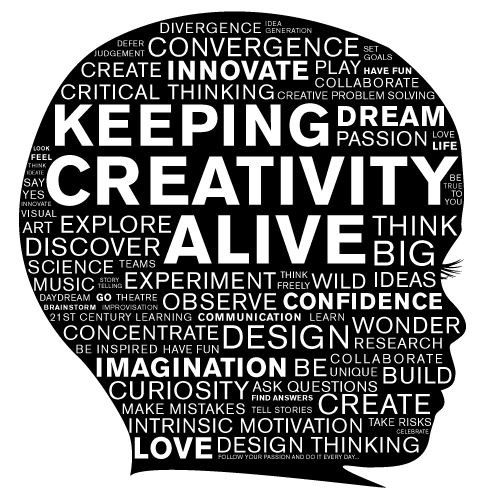 As with any element of psychology, there is a heavy debate as to whether Creativity is a product of genes or external factors. Some people believe that some are born with the ability to see things that others can’t. That the likes of Nancy Yi Fan (author of best selling Sword Bird series at the tender age of eleven) was born with the need and the skill to write. Others believe that people are raised to see differently. That you get out of yourself, what you put in. And these desires to be the best are fuelled by those around us and the things that we see.
As with any element of psychology, there is a heavy debate as to whether Creativity is a product of genes or external factors. Some people believe that some are born with the ability to see things that others can’t. That the likes of Nancy Yi Fan (author of best selling Sword Bird series at the tender age of eleven) was born with the need and the skill to write. Others believe that people are raised to see differently. That you get out of yourself, what you put in. And these desires to be the best are fuelled by those around us and the things that we see.
 I’d like to believe that’s it’s a product of both. Because if you can believe that increasing creativity is possible, then you can believe that you can learn to channel this skill in your field; through the self-training of your mind set. And isn’t bettering yourself, what success is all about?
I’d like to believe that’s it’s a product of both. Because if you can believe that increasing creativity is possible, then you can believe that you can learn to channel this skill in your field; through the self-training of your mind set. And isn’t bettering yourself, what success is all about?
Either way, all creative persons must work on their creative talents to the same extent, to put them out there to the world. If you’re good at drawing, you know you’re good at drawing and you’ve always been good at drawing. That’s great, good for you.
But you won’t become the next Walt Disney just sitting on the sofa enjoying someone else’s creations. The opportunities, won’t find you. And there’s always going to be someone else learning to draw just as well as you, just next door.
As a creative person myself, I know there are days when inspiration thinks it’s fun to hide away when we most need it. And on those days, I used to be quite unapproachable, I’ll admit, because the world seemed that much more of a grey and concreted place when there was nothing to see.
What you have to get into your head is that… there is always something to see. The second I learnt this skill and the importance of the breaks we take between creative bursts, was the second those dull days became history.
My Top Ten Tips on How to Improve Creativity
1) Don’t limit your thinking – If you’re hard at work on something and life throws another opportunity your way… don’t rule it out. Inspiration can be found in the most unlikely of people and places and part of training a mind to be flexible, is being flexible in your physical tasks.
So weave in any opportunities that you can. Chances are that “the website”, “the book”, “the project” is something that you can come back to. Opportunities, on the other hand, usually, come about only once and it’s more important that you cover all possibilities and explore every approach before you make the leap; than taking the leap itself.
2) Don’t spend your life thinking the big idea will come to you – It won’t. When you’ve got no more places in your head to explore, don’t lay at your desk waiting for inspiration to knock on the door when she’s back home, go out and explore the world outside your head. I’m sure she’ll catch up and meet you later. She’s reliable like that.
3) See your life as a creation – If there aren’t any classes out to teach you what you want to learn; make opportunities, find opportunities and take opportunities. Only you can make yourself a success, nobody will fall down from the sky and hand you your big break.

The apple fell on Newton’s head, sure, but the idea of gravity was always there. It just took a stimuli to trigger it. It’s the same in the field of creativity; all the best ideas will stem from what you know and what you believe in. So if you surround yourself with stimuli and you will find what you’re looking for.
4) Talk to other people – To inspire the future, you have to learn and build on the past. This could be in terms of past successors in your field, but also in terms of other, ordinary people in your field. Talk to those like-minded, and even those that aren’t; I’m a great believer that taking time out to socialise and learn about other people is one of the best ways to stay inspired and keep your mind alive and open.
5) Find somewhere that is yours to create – It’s as important to be able to take critism of your work constructively as it is to believe in your work. As long as you keep your core close, listen to the people (they’re the ones after all who you’re providing for). But whilst you’re in the initial creative process (and I’m talking, the raw, raw stages) keep the door bolted, barred and stapled shut.
 Your ideas are your children and in their youth they need your support and your protection. Having that little area in your mind, just for you to make your own decisions, your own choices; the core to the idea, is not a bonus but a necessity of all creative people.
Your ideas are your children and in their youth they need your support and your protection. Having that little area in your mind, just for you to make your own decisions, your own choices; the core to the idea, is not a bonus but a necessity of all creative people.
Keeping your ideas there, until their strong enough to face the world, is vital. But it’s also important, physically, that you can learn to work anywhere. So by that ‘somewhere’ I’m not suggesting restriction of any kind. Restriction is the creative person’s poison.
6) “Know that life is a support for art not the other way around” – Steven King
When the days are rough, you need a family (and a day job) to keep you going, to support you. When the days are rough, you also need the ability to take a rest. In fact, it’s my advice to stop, just as it’s getting good.
The second a creation becomes a routine or a job, is the second that it’s dead. And if you get too absorbed into your creation; you’ll be nothing more. And without a purpose for the work, there is no purpose. I’m sorry to say, you’re wasting your time. Having a backbone makes it easier to build up the flesh. You may have taken a little time out of your day to keep it strong, but it’s worth every second I assure you.
7) Work, plan, be logical – Going on from the last point, however, it is important that your
Creativity is funnelled down to an idea rather than many ideas that never forward on into action. Creativity is in itself an opposition to organised. The one rolls the eyes at the other. But try. Because behind any creation needs a fuel. Or else the ideas will stay in the notebook; a post-it and nothing more. Quite often this is where collaboration comes in.
8) Don’t make excuses, make time – Time is not an excuse. If you want to create, you have to be dedicated to what you do. For more on how early mornings can help you, see my post on mornings.
9) Be willing to drop things, and accept failure – If something isn’t working, if you’re bored by what you do, drop it now. Creativity isn’t always going to be fun. But if the work feels like work, if you have no ideas; then your heart isn’t in it and it’s not “the one” for right now. No idea is a waste of time, with every idea (even a failed one) is an opportunity to learn. And if you keep it close, there’s always a chance to go back to it when you’re more prepared in later time.
 10) Constantly keep your mind moving – How is it that some people are more successful than others? Why are Walt Disney’s movies still watched today? Because they evolve with their audiences minds. When creating, don’t get engulfed by the creations the time provides; see the time as an opportunity; a tool. Because you have something now that people in the fifties hadn’t dreamt of. You have the ability to self-publish, to make a website. The ability to put forward your ideas and to teach and entertain in more ways than ever before.
10) Constantly keep your mind moving – How is it that some people are more successful than others? Why are Walt Disney’s movies still watched today? Because they evolve with their audiences minds. When creating, don’t get engulfed by the creations the time provides; see the time as an opportunity; a tool. Because you have something now that people in the fifties hadn’t dreamt of. You have the ability to self-publish, to make a website. The ability to put forward your ideas and to teach and entertain in more ways than ever before.
These are just ten ways that you can broaden your mind in increasing creativity. But remember that wherever your world is, whoever is in that world and whatever that world revolves around there is always something new to see and reflect. Hopefully these tips will help fuel the mind-set that makes you see and think different.
Wrote by Aimee Hall





